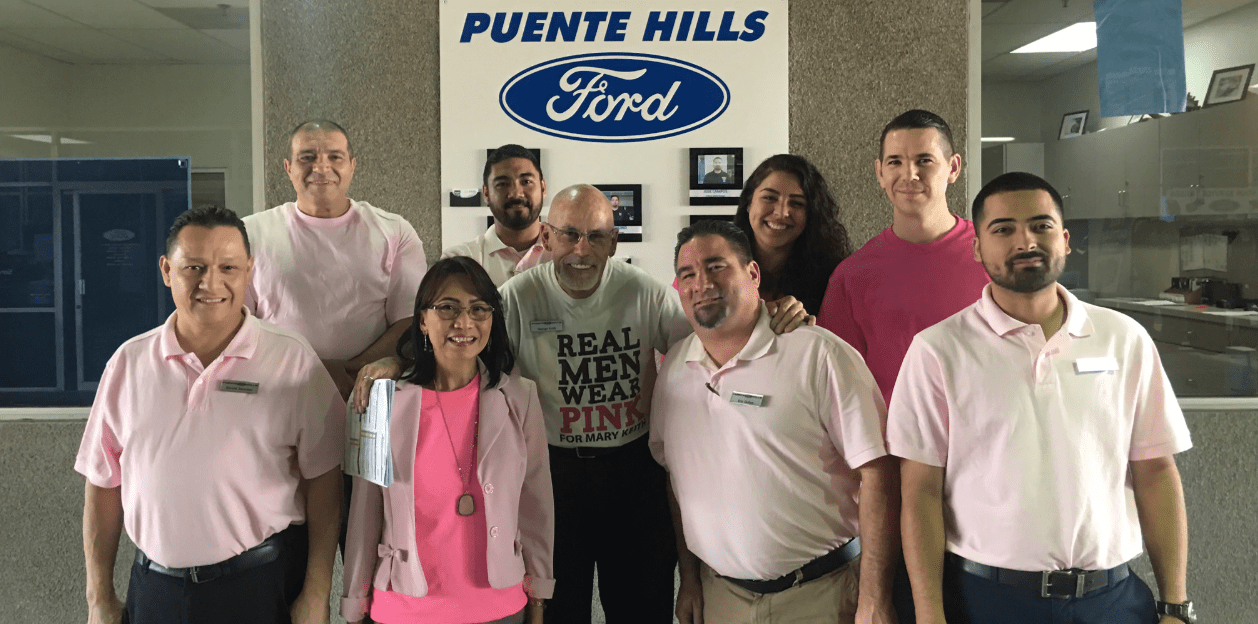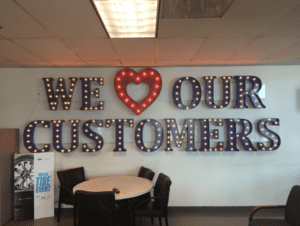“I just got out of a meeting pumping up my guys for you and I’s interview. It’s all about pumping the guys up because some people forget they’re the people that make the dealership,” Julian Valeriano, General Manager at Brown Auto Group’s Puente Hills Ford location, says excitingly at the start of our call.
Julian is a Texas boy, born and raised, with automotive industry experience for almost two decades and having just joined the Southern California dealership’s team about a year ago. Today, he and his store are known for providing customers with a touch of southern hospitality, inspired by his roots growing up just outside Austin, TX. Open door policies, store decorations that tug at the heartstrings and exceptional phone skills ring true throughout Sales, Service and Parts.
Five years ago this wasn’t the case. The Service drive had one of the lowest CSI scores across the U.S. Employees seemed apathetic and management didn’t do much to drive staff improvement. It was a broken dealership, as described by the Texan turned Californian.
Fast forward four years with Mr. Southern Hospitality (Julian’s) arrival, and Puente Hills Ford earns the privilege of #1 CSI score in the region.
Earning this wasn’t easy and didn’t happen overnight. The biggest challenge in overcoming the store’s history was getting everyone on the same page and earning agents’ trust. Managerial expectations and automotive best practices weren’t always aligning with agents’ actions. To initially solve for this, Julian and fellow managers started training new agents for a few weeks before they handled customer calls, as well as shadowing other salespeople and managers. Valeriano revealed that if you show someone the right way to do something and open up that communication across teams, then after about 2 weeks they should get it.
I then ask him how the team achieved such a milestone and he primarily accredits it to growing up in Texas: transferring the Golden Rule into the automotive industry by offering an unparalleled customer service experience.
“We bought a sign in our service department that says we love our customers. A lot of times it’s hard for people to say the ‘L’ word. I had a customer say the other day, ‘You guys love me?!’ It was a joke but it’s good when you see things like that. I’d say that’s one of the main things that got us to where we need to get.”
It wasn’t just a glowing, unobstructable sign that magically solved every problem.
Taking advantage of the phone was instrumental in achieving Puente Hills Ford’s success — so much so that Valeriano and his fellow managers have made it a standard for the whole team to be easily accessible to customers: letting the customer have all the salespeople and sales managers’ cell phone numbers on speed dial.
“Once you sell a car, it’s not like it’s over and done with,” Valeriano said. “Even if they buy a car from us and move out of town, they’re a customer for life. If you provide your cell number, you’ll pick up more deals and more happy customers, I swear.”
“Even if they call back and need directions, just give them directions,” he added. “Treat everyone how you want to be treated. If someone calls and they’re trying to reach another dealership but accidentally call yours, just be nice and tell them that if it doesn’t work out at the other place to come back and see you. Always do the right thing; it’ll always work out for you.”
Anybody will tell you that he makes the most phone calls in the industry. “You’re the guy that used to make 200-300 phone calls a day,” they say when first meeting him. He claims that activity got him to where he and the store are at today — by monitoring and believing in the power of the phone.
“The customer needs to hear your voice, a voice asking how their day is going,” he said. “I’m going to make my store called Phone Call Ford or something.”
The fact that Puente Hills Ford has hundreds of dealerships within a 50 mile radius (some of which are the highest performing in the country: Longo Toyota and Galpin share nearby real estate to Valeriano’s store) — providing the best customer service possible over the phone is more important than ever.
“This is our biggest challenge,” the General Manager said. “Longo Toyota is 15 minutes up the road; they sell about 2,500, 3,000 cars per month,” he added. “You better be a better salesman than the other one and know your product. Also, lot of people are online — they’ll get on the phone to get a price. So we have to lead with our best numbers. At the end of the day, make sure they get the right service and that you know your product knowledge on every call.”
Another solution Valeriano adopted to turn the store around was creating a culture of phone accountability. There’s always someone monitoring the phone calls and phone handlers for performance. With their BDC Department listening to phone calls for missed opportunities, they get handled right away with a follow up call to the customer, letting him or her know that the agent is gathering information and handling it.
Speaking of handling missed opportunities — Valeriano also instilled a process for a call tracking software that sends managers an email every morning that pinpoints how many appointments the store has, broken down by firm and soft appointments.
“That’s 90% of the business,” said Valeriano. “Because when you can monitor that, that’s when you’re successful. No matter how long people have been here, you have to manage them every day. We have daily meetings and managers sitting with the sales team, going over their calls with them. If they know that you’re managing them and you’re keeping them accountable, they’ll do it every single day.”
Valeriano received pushback from the guys at first after letting them know about the new call monitoring process.
“One time actually, one of our guys was speaking really fast on the phone and the customer couldn’t get his phone number,” he said. “I helped coach him on that call — when they know they’re being monitored, they may not like it at first, but when they make that first deal on the phone, they’ll start to believe in it.”
The store, owned by The Brown Auto Group, employs the “Brown Promise,” where if customers have a concern or issue they can directly email the group’s owner, Greg Brown.
Why Valeriano and Puente Hills Ford go so above and beyond, I ask him. What’s he trying to accomplish bringing this southern hospitality charm to Southern California — a polar opposite landscape?
“Buying a car is the second biggest purchase you’ll do; some people don’t even buy houses out here because the California market is so high. When customers buy a brand new car, you just gotta have excitement for them,” he replied.
Because of Valeriano’s southern hospitality in turning the store around, not only has Puente Hills Ford right had the honor of the best CSI in Southern California (a beaming score of 100!), the team has also seen:
- An increased gross profit by 75%
- Appointments sold deals increase by 45%
- Sales margin at 30% year after year
- More return customers and walkins
- Lower turnover
- Heightened upcount
While the Texan at heart realizes business takes priority in the car biz, treating others with respect holds just as much weight in his eyes in achieving success.
“I was brought up to say ‘Yes ma’am’ or ‘No ma’am’ and open doors for people — that Southern comfort,” he said. “When you do that with customers and with employees, they see that it’s different here. I’ll get emails from people saying that they didn’t buy a car here but that they just wanted to say Tevita did a great job, or Joey was awesome, or go see David Lam — that means a lot to me; even if we only had a 10 car day, we still did our job. I think bringing that southern hospitality to SoCal will increase your sales and your CSI like it has for us these last couple months.”
Before we let each other go, he gives me one last bit of heartwarming advice:
“Back when I was a salesperson, I called a guy for six months in a row. One day I called him and his sister had passed away. I listened to him for about an hour. He never bought a car from me. If I wouldn’t have made my phone calls I wouldn’t have been able to help him. To this day he still sends me people. That’s how important treating people good and making your phone calls in this business is.”









